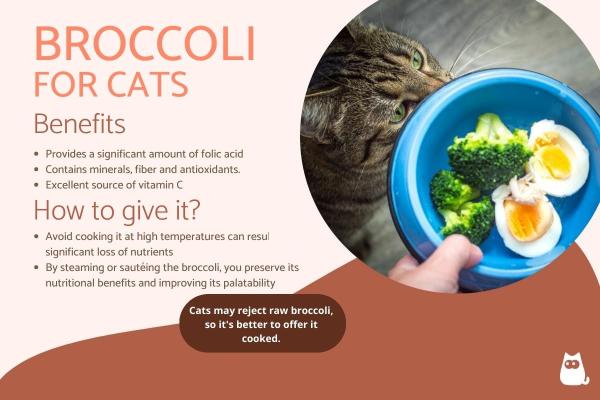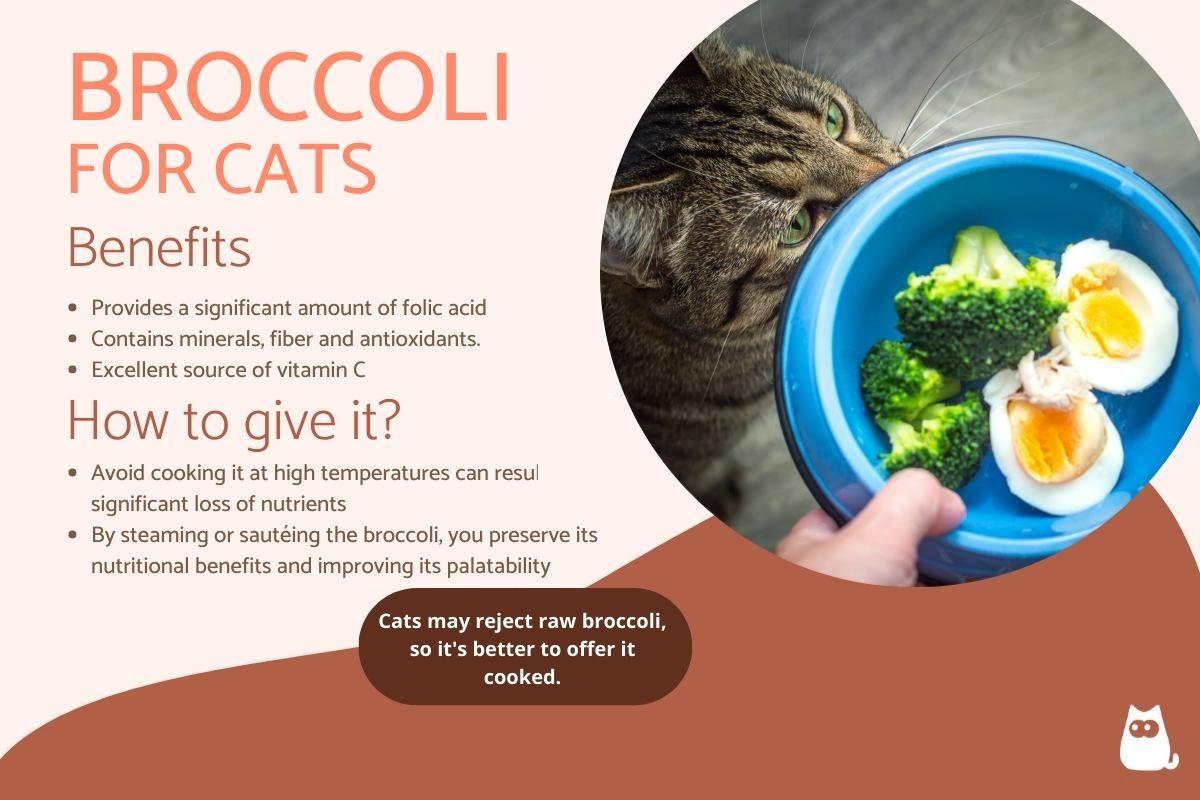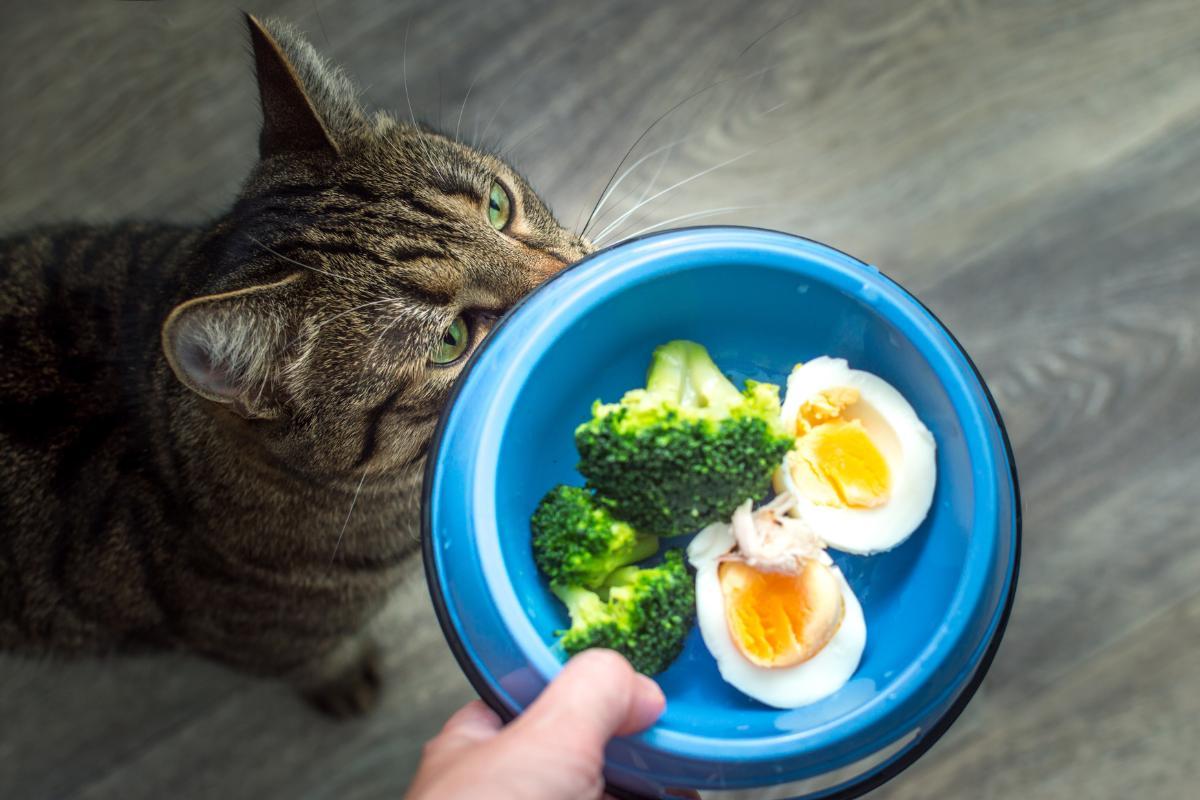Can Cats Eat Broccoli?



See files for Cats
Broccoli, a member of the Brassicaceae family, boasts an impressive nutritional profile, earning it the title of the vegetable with the highest nutritional value per unit weight. It's no wonder that it is highly recommended as a beneficial ingredient in human diets. But what about our furry friends? Have you ever wondered if cats can eat broccoli?
In the following AnimalWised article, we provide answers to the question whether cats can eat broccoli. We delve into the effects of feeding broccoli to cats, including potential side effects and contraindications to consider.
Can cats eat broccoli?
As mentioned earlier, broccoli is widely recognized for its exceptional nutritional value. In fact, it holds the title of being the vegetable with the highest nutritional density per unit weight. This cruciferous veggie boasts a remarkable composition of fiber, minerals, and vitamins, making it a commendable addition to a balanced diet.
Benefits of broccoli for cats
One of the standout qualities of broccoli is its rich content of essential nutrients. Notably, it serves as an excellent source of vitamin C, which is renowned for its immune-boosting properties.
Additionally, broccoli provides a significant amount of vitamin B9, commonly known as folic acid, which plays a vital role in cell growth and development.
The mineral profile of broccoli is also impressive, featuring minerals such as iron, phosphorus, and potassium, all of which contribute to maintaining optimal bodily functions.
Interestingly, broccoli is considered a safe and suitable food for cats, as it lacks any toxic or harmful compounds. In fact, numerous commercial cat foods recognize the benefits of broccoli and include it in their ingredient lists. However, it is crucial to take certain considerations into account before introducing broccoli into a cat's diet, ensuring its contribution is both safe and beneficial for these animals.
In the following sections, we will delve into the specific details of incorporating this nutritious vegetable into a cat's dietary regimen.
Is it safe for cats to eat cooked or raw broccoli?
Now that we've established that broccoli is indeed a cat-friendly food, you may be wondering about the best way to serve it to your feline companion. The question arises: Can cats eat cooked broccoli, or is raw broccoli a suitable option?
While cats can technically consume raw broccoli, it's important to note that they often tend to reject this vegetable in its raw form. Therefore, it is generally recommended to offer cooked broccoli to cats.
When preparing cooked broccoli for cats, there are a few key considerations to keep in mind. Boiling broccoli for an extended period or cooking it at high temperatures can result in a significant loss of nutrients, particularly vitamin C.
To preserve the nutritional value while enhancing palatability, steaming or sautéing the broccoli is recommended. These cooking methods allow you to maintain the vegetable's nutrient content while making it more appealing to your cat's taste buds.
By steaming or sautéing broccoli for your feline friend, you can strike a balance between preserving its nutritional benefits and improving its palatability. This ensures that your cat can enjoy the goodness of this vegetable without sacrificing its nutritional value.
If you're interested in providing a raw food diet for your cat, also known as the Biologically Appropriate Raw Food (BARF) diet, we have another article that covers this topic in detail.
How to offer broccoli to your cat
Now that we have established the best methods of cooking broccoli for cats, let's explore how we can incorporate this ingredient into their diet. Here are some ideas:
- For cats fed with homemade food: If you typically provide your cat with a homemade diet, incorporating broccoli is fairly straightforward. Simply include it as one of the vegetables in their daily portion. As mentioned before, cook the broccoli using the recommended methods and mix it with the other ingredients according to the appropriate ratios for each food group.
- For cats fed with commercial cat food: If your cat's diet consists of commercial cat food, you have two options. Firstly, you can opt for a brand that already includes broccoli in its list of ingredients. This way, your cat can benefit from the nutritional value of broccoli without any additional effort on your part. Alternatively, if your chosen cat food does not contain broccoli, you can offer it as a complementary treat or reward (provided your cat enjoys it). It's important to keep in mind that these treats should be factored into the cat's overall daily food intake.
Remember to consider your cat's preferences and dietary requirements when introducing new ingredients, and consult with a veterinarian for personalized advice on your cat's specific dietary needs.
For more information, read this other article on what is the best diet for cats for further guidance on the specific percentages of each food group in a homemade cat diet.

Recommended quantity of broccoli for cats
The amount of broccoli you can feed your cat will depend on several factors:
As an ingredient in a homemade diet
If you choose to include broccoli in the vegetable fraction of your cat's daily homemade diet, the quantity should be determined based on your cat's specific nutritional requirements. Factors such as age, sex, physical activity, and physiological state (e.g., pregnancy or lactation) should be taken into consideration.
It's important to achieve a proper balance between animal and vegetable ingredients in the overall diet. To ensure a well-balanced and tailored diet, it is advisable to consult a veterinarian specialized in nutrition. They can provide guidance and help design a homemade diet that meets your cat's individual nutritional needs.
In a balanced homemade diet for cats, animal ingredients should make up the majority of the diet, while vegetables and other plant-based ingredients serve as supplementary components. A common guideline is to aim for a ratio of approximately 80% animal ingredients to 20% vegetable ingredients.
As an occasional treat or reward
If you decide to offer broccoli to your cat as an occasional treat or reward, a small portion would suffice. You can offer a couple of florets, for example, once a week or every two weeks. This allows your cat to enjoy the taste and benefits of broccoli without compromising their overall dietary balance.
Remember, moderation is key when introducing new foods to your cat's diet. It's essential to monitor your cat's reaction and ensure that any changes in their diet are gradual and well-tolerated.
Potential side effects of feeding broccoli to cats
In most cases, the inclusion of broccoli in a cat's diet should not cause any adverse health effects. However, it's worth noting that some cats may experience digestive issues such as flatulence or poor digestion when consuming broccoli. If you notice such symptoms in your cat after introducing broccoli, it is advisable to discontinue its inclusion in their diet and consider substituting it with other vegetables that are better tolerated.
Cats, like humans, can have individual variations in their digestive systems, and some may be more sensitive to certain foods than others.
It's important to pay attention to your cat's response to new foods and make adjustments accordingly to ensure their overall well-being.
As mentioned before, if you have concerns about your cat's digestive health or need guidance on suitable vegetable alternatives, consulting with a veterinarian is recommended. They can provide personalized advice based on your cat's specific needs and help you choose the best dietary options for them.
If you're interested in learning about recommended fruits and vegetables for cats, we have another article that provides comprehensive information on this topic.
Contraindications of feeding broccoli to cats
While broccoli is generally considered a suitable food for cats, there are specific situations where its inclusion may be contraindicated:
- Cats with allergies or food intolerances: some cats may have allergies or intolerances to certain foods, including broccoli. If your cat has a known food allergy or intolerance, it is important to avoid feeding them broccoli or any other food that triggers an adverse reaction.
- Cats with digestive diseases: Cats with certain digestive conditions such as gastroenteritis, inflammatory bowel disease (IBD), or digestive lymphoma may have sensitive digestive systems. In such cases, introducing new foods, including broccoli, can exacerbate their symptoms or disrupt their delicate digestive balance.
- Cats with a sensitive digestive system: Some cats have a particularly sensitive digestive system that reacts strongly to dietary changes. In these cases, introducing broccoli or any new food may lead to gastrointestinal issues or discomfort.
- Cats with thyroid problems: cruciferous vegetables like broccoli contain goitrogenic compounds that can interfere with the normal functioning of the thyroid gland. Cats with thyroid issues, such as hyperthyroidism or hypothyroidism, may need to avoid or limit their consumption of broccoli to prevent any potential negative effects on thyroid function.
As with any dietary changes or concerns about your cat's health, it is always best to consult with a veterinarian. They can provide personalized advice based on your cat's specific health conditions and dietary needs.
If you want to read similar articles to Can Cats Eat Broccoli?, we recommend you visit our Homemade diets category.
If you want to read similar articles to Can Cats Eat Broccoli?, we recommend you visit our Homemade diets category.
- Ministry of Agriculture, Fisheries and Food. broccoli Brassica oleracea. Available at: https://www.mapa.gob.es/es/ministerio/servicios/informacion/brecol_tcm30-102693.pdf






